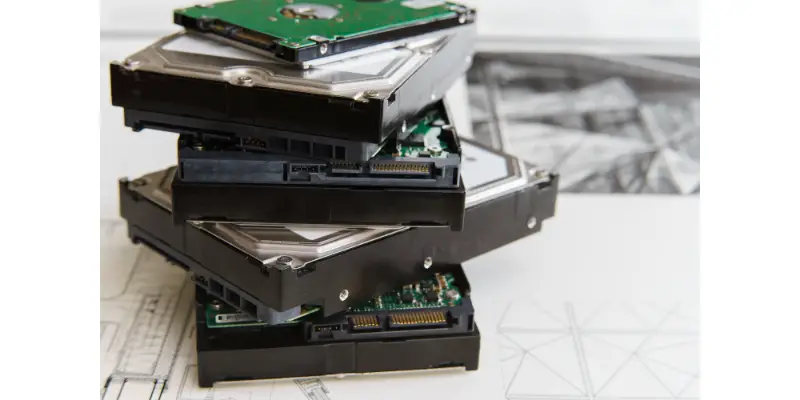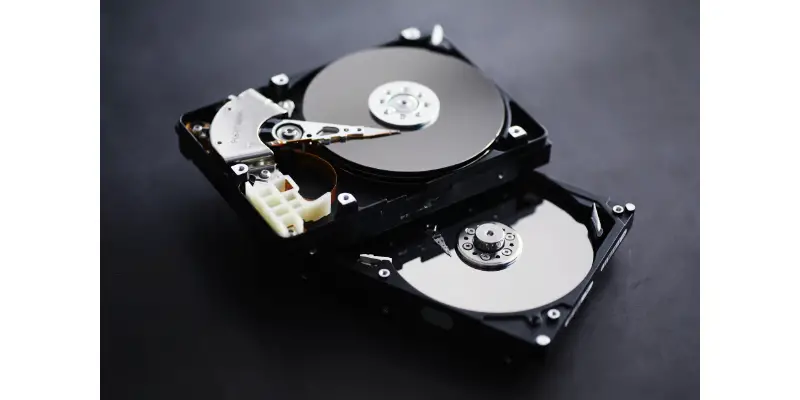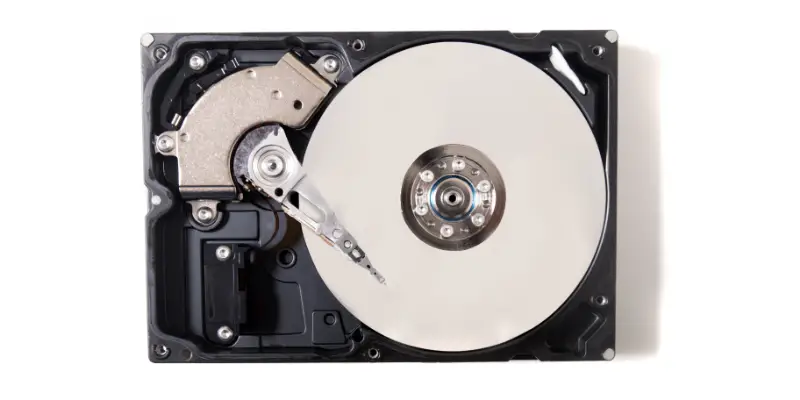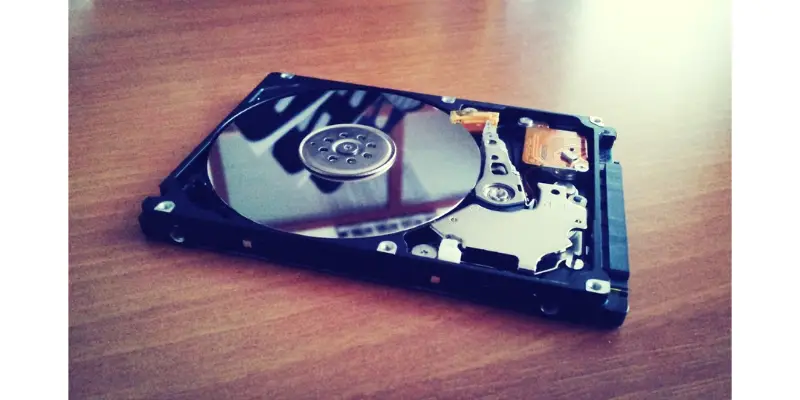Disclaimer: This post may contain affiliate links, meaning we get a small commission if you make a purchase through our links, at no cost to you. For more information, please visit our Disclaimer Page.
One reason why two smaller drives may not be as fast as one large drive is some factors such as read/write, cache sizes, and seek times may also impact each drive’s performance. But you can still get the best if the two hard disks connect via different controllers. However, this is only possible if the motherboard has more than one controller.
Having a larger hard drive is better since it is faster compared to buying two smaller drives. However, if you can have the RAID set up, you will likely enjoy double speed if the RAID is correctly formatted. Also, it may be necessary to ensure that you use both drives separately.
But when you connect the hard drives on the same controller, it reduces performance, and you will experience a drop in writing speed or copying of files from HDD. Note that having two files could improve the performance of the drives if you use both drives simultaneously.
For instance, having system files on one drive and all other files on the other drive may allow concurrent use of the file, significantly reducing the amount of time it takes to access a file. But if you decide to put the files randomly, it may not be of any benefit.
Table of Contents
Do I Need 2 Storage Drives?
Although most PCs come with a single standard hard drive, it may not be the best for you, so you may want to add more drives to your computer. Installing multiple drives comes with certain advantages if you correctly install the drives. Here are reasons why you may need two storage drives.
Can Fit In Your Data Backup Strategy
The PC comes with a standard single hard drive which is large enough to store all your work. But there are cases where the single drive may not be sufficient for you. In such a situation, you may consider buying multiple drives for your computer. It helps you make the correct hardware choices when the need arises.
Increases storage spaces- when you increase the number of drives on your computer, it increases storage spaces and will allow you to store more files. It may make storing graphic files easier and allows you to edit videos easily. It may also be convenient compared to installing a single large drive with two times space.
Reduces The Cost
A single disk with massive storage capacity will cost more than what you would spend on two smaller disks but with equal combined space. So, when you chose to use two smaller drives instead of a single drive to get the desired storage spaces, you spent less money.
Reduces Redundancy
When you use two drives in a PC, it allows you to easily back up your data which enhances the security of your data. Also, you have enough room to create multiple copies of essential files meaning that you will safeguard yourself from the adverse effects of hardware failure. Also, it protects you from user errors that can ruin your files. Also, it spreads the data across multiple drives and stores the data in formats that are resistant to hardware failure.
But to get the best from the idea of having multiple drives on your computer, it may require that you involve an IT specialist to ensure that you use the right software and tools to manage the drives. Also, you will need to protect your computer from malware if you want to get the best from investing in multiple drives.
Helps you to manage resources
Having multiple drives is an added advantage. It allows you to manage your programs by similar programs on one drive. It allows you to keep the OS and other related files on one drive while having business transaction files stored on a separate drive.
Can You Run Two Hard Drives At The Same Time?
You can run two hard disks on the same computer by adding the second drive to the computer. You may choose to have an external or internal hard drive.
If you choose to use it as external storage, you need to plug it in the Serial Port or USB and boot your computer. You can then use the second drive similar to the way you would use a flash drive or a zip.
You can install extra storage even if you do not have any knowledge of computers. You can connect it externally or internally. When you choose to connect it externally, you will be free to unplug and move it from one computer to another. You may also decide to connect it internally. This way, it will remain on the computer and cannot be used on another computer.
But you may need to connect the hard drive to the USB before you boot the computer. If you choose an external hard drive, the device will be ready once it has booted.
Whether you connect it externally or internally, you may use the hard drive just the same way you use a flash or zip drive. But you may need to set up any software that may allow you to back up your file on the drive. You may also copy some files on the folders to the drive just in case of a crash.
Back up the main C to the drive. You can do this by clicking on the backup option under the system tools, accessories, or program from the start menu. It ensures that all your data is backed up, and you will never be at the risk of losing important media files.
You can then store your large files such as Mp3’s and videos on the drive. They are files that take up more spaces on the primary hard drive. Therefore, moving them to the second drive will allow the main drive to respond faster and allows your computer to be faster.
How to configure two hard drives
To use the two hard drives simultaneously, you may need to configure them in a RAID array. The method automates the backup of files and allows the two disks to operate like one. It spans the disks allowing them to operate like one.
If you are using windows 7 or above, you can configure the disk as part of RAID by going through the following steps:
Attach the drive to the computer and click Take no action. Go to the Start button and take note of the drives’ letters.
Click on the start menu, right-click on the computer, go to the manage option, and click on storage to select disk management. The windows will display the hard drives.
Click on the drive to create a RAID partition; go to Delete Volume and select it. It creates an unallocated drive. You may do the same for the second drive. You will have the drives numbered as 1, 2
Right-click on the first drive and click on New Mirrored Drive. A question will pop up asking you the drive you would love to mirror. Click on the second Drive and HDD.
A message will pop up asking you to create a single drive that mirrors the disks and allows them to copy each other.
You may also run two drives at the same time where you create some extra storage room while speeding up your computer. You may also use the extra disk to protect your computer system from crashes. Here is how you do it.
Choose one disc to house windows while using the other one to store data. It will allow you to have one room to store data while using the other to speed up your computer or protect the system from crashes.
Separate Data And Window Files
Separating the windows installation and other files helps protect the files from malware and crashes that may result in loss of data.
If the motherboard supports and your drives are of similar capacities, you may set up a RAID O that turns the two drives into a single large drive.
Moreover, you have the ability to create a RAID 1, which writes data on the drive spontaneously. However, this option doesn’t speed up your PC. Instead, you’ll have to make use of some storage space.
Fortunately, you are subsequently safe against permanent loss of data with two sets of data since you will have backed up the data on the remaining drive. The only catch when creating RAID 1 is that the hard drives you use have matching capacities.
Transform An Internal Hard Disk Into An External One
You can remove the extra drive and install a SATA-USB drive enclosure for less than ten dollars. As such, this transforms it into an external drive that you could use to back up your data. Moreover, in addition to enjoying the extra space, you will also have additional room to store your overflow files even if your main drive runs out of space.
Is It Bad To Have Multiple Hard Drives?
Connecting multiple drives, especially WD VelociRaptors, on a single rig can be risky. Such high-performance drives operate at 10k rpm, which in turn produces a lot of vibrations and heat. Since doing so may result in higher failure rates, I do not recommend that you use them in larger drive pools or even RAID arrays.
Although you may be able to run five or more hard drives without experiencing any problems with your PC, depriving your computer of enough cooling capacity kills it slowly. Additionally, besides putting your device at risk of destruction, the connected hard drives are also at risk of failing. The drives won’t necessarily explode but will ultimately cease to function.
In addition to poor ventilation, connecting multiple hard drives while running under low voltage or amperage could also kill the drives. Also, since losing your hard drive entails losing all your data in it, it is important to carry out data backups if you must use multiple hard disks on one PC.
Does Having Multiple Hard Drives Slow Down The Computer?
No, you can add as many hard drives as your motherboard allows without the risk of slowing down your PC. Since each hard drive utilizes its own designated SATA port, filling them will not affect your PC performance in any way whatsoever. I have 4 WD Green 500GB hard drives, and still, my computer doesn’t show any signs of slowing down, at least not yet.
However, since hard drives connect directly to the motherboard, the only drawback to connecting multiple is that it increases power consumption. As a result, your computer’s PSU is the only component that feels the load. You are only likely to face issues with overheating; hence there is no need to make a mountain out of a molehill over the recommended number of hard drives to use.
Is It Better To Have One Big Hard Drive Or Two Smaller Ones?
It can be quite difficult to understand whether several smaller hard drives are more reliable than an extremely large drive. As such, I have prepared several pros and cons that should help you decide whether to go for multiple smaller drives over one massive hard drive.
Firstly, the rule of thumb states that the larger the size of the Hard Drive, the higher the failure rate, which turns out to be very catastrophic. Read below to get a complete answer on whether it is better to have one big hard drive or two smaller ones.
Cost Factor
Regarding price, it will surprise you that purchasing a 12TB hard drive is 30% more expensive than buying three 4TB drives, depending on the product quality. As such, even with similar space capacity, purchasing a 12TB drive will cost you more.
Risk Of Data Corruption
The lifespan of a typical hard drive ranges from about five to six years. Thus, when a hard drive reaches its end of service, all your data stored in the device becomes corrupted. With this information in mind, you realize that losing a 12TB full of critical data is a far greater loss than if one of your three 4TB hard drives fails. Even better, the latter misfortune leaves you with 8TB of storage space.
Keep in mind that RAID should be avoided in order to safeguard data from corruption because it is not entirely safe. Instead, you must not only backup important information, but also create a clone of the complete hard drive on another blank disk.
Noise, Heat, Vibration, Power Consumption
Considering the noise, heat, and power consumption effects, I would recommend that you choose a high-capacity drive to minimize such challenges. Since hard drives are mechanical devices, they contain an always-in-motion platter that creates a sound and the head, which causes the vibration.
Following this logic, you can see that using numerous low-capacity hard drives generates sound and vibrations that are several times more than those produced by a single high-capacity drive.
Thus, according to our previous examples, using three 4TB hard drives produces three times louder sound than a 12TB hard drive. Additionally, you have to deal with sound issues and face three times more power consumption and heat production with multiple hard drives.
This, in turn, increases your utility bills, which cancels out the cost advantage of purchasing several smaller drives over one larger hard disk.
Cable And Airflow Hazards
Connecting several internal hard drives in your PC poses additional cable hazards because of the heat they produce. Subsequently, such cable hazards hamper airflow significantly, which may result in more far-reaching problems.
Here is the reasoning behind all this. A consumer-grade cabinet features four slots for your hard drives, while in the case of motherboards, you have a maximum of six SATA ports (which translates to six slots) available for your hard drives.
Now, suppose hard drives occupy all four or six slots. In that case, you will hamper airflow since connecting more hard drives requires adding more power connectors and SATA cables, which significantly affects airflow. Subsequently, by hampering airflow, your PC build produces more heat that not only risks slowing down your computer but also shortens its lifespan.
A single maximum-capacity hard disk drive, on the other hand, generates less heat and hence has a little impact on your PC. Moreover, with reduced cables and power connectors, you maximize airflow, thus reducing the need to carry out frequent maintenance and repair services for your build.
Be Future-Proof
With technology being a highly dynamic field, many changes are bound to occur with the turn of every half a decade. As a result, the dynamic nature of this niche requires volatility and flexibility in every aspect. In regards to the subject, filling all the four hard drive slots in your computer with smaller drives renders you unprepared for the future.
For instance, you may not be able to connect an additional drive to store additional data. Still, you are able to add another one in the future if you are currently using a single high-capacity drive. There are other numerous advantages to using one big hard drive, such as being able to upgrade to other types of storage devices such as SSDs. If you’re interested in additional reading, we have an article about SSD that’s similar to this topic.
You can connect many external hard drives to your system; in this scenario, a low-capacity hard drive is a preferable option so that you don’t lose a large amount of important data. Yes, there will be a lot of noise or vibration, but it will not affect external hard drives, heating, limited space or slots, or restricted ventilation.
They will not harm your PC’s system in this way, and you may safely store essential data on an external low-capacity hard drive. Finally, as previously said, when it comes to money, three 4 TB hard drives cost significantly less than one 12 TB hard drive. As a result, adopting low-capacity hard drives versus large-capacity hard drives has additional advantage.
Conclusion
My advice is that if you wish to utilize numerous internal low-capacity hard drives instead of one large-capacity hard drive, you should reconsider since the repercussions can be severe in the future, as detailed in this post.
It is entirely up to you to decide what to use or not use, but you may still utilize numerous external low-capacity hard drives instead of a single large-capacity drive without inflicting major damage.
However, if you are confident that you will be able to take advantage of many of the benefits listed above, you should select a low-capacity external hard drive. If you have the funds, you should consider getting a large-capacity hard disk.
Even though it has its own set of advantages, using many low-capacity internal hard drives might have a number of drawbacks. However, if you use a lot of low-capacity external hard drives, this is a huge help.




